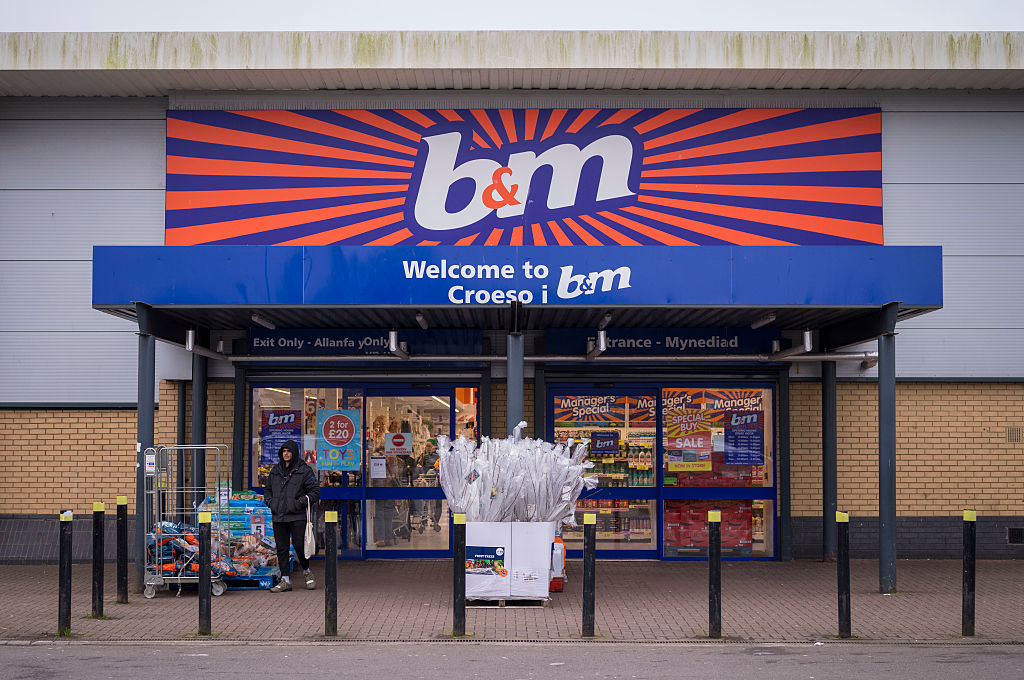Trouble brews in B&M as bargain shops take a hit
Once a stock market darling, B&M's share price has slumped. What has gone wrong for bargain shops?


Get the latest financial news, insights and expert analysis from our award-winning MoneyWeek team, to help you understand what really matters when it comes to your finances.
You are now subscribed
Your newsletter sign-up was successful
Want to add more newsletters?

Twice daily
MoneyWeek
Get the latest financial news, insights and expert analysis from our award-winning MoneyWeek team, to help you understand what really matters when it comes to your finances.

Four times a week
Look After My Bills
Sign up to our free money-saving newsletter, filled with the latest news and expert advice to help you find the best tips and deals for managing your bills. Start saving today!
B&M used to be one of the stars of the London stock market. The discount chain was founded in Lancashire in the 1970s and expanded rapidly throughout the UK with its cheap and cheerful mix of bargains for the home and the kitchen. The shares hit more than 650p back in 2021, more than doubling over the previous five years as the brand became better known. Over the last year, however, the share price has slumped by more than 40%. Last week, it reported annual profits were down by 13%, and while it managed to increase overall sales slightly, that was only by opening 70 new stores; its like-for-like sales were down by 3% over the last 12 months. The shares fell another 10% on the news.
Its rival, Poundland, is not doing any better. The chain has already been put up for sale by its Polish owners, and it has been reported to be planning a restructuring that would see store closures and rent reductions imposed on landlords. Likewise, Wilko, which operated in a similar part of the retail market, has now gone under. Add it up, and one point is clear. The chains that specialised in selling you some cheap tea towels, a huge bar of chocolate, or a phone charger for a pound or less are all struggling.
In many ways, that is surprising. After all, with a cost-of-living crisis, you might expect the discount shops to be booming. Taxes are rising relentlessly, meaning that people have less money to spend, and they will almost certainly go up even more in the autumn. The economy has stalled, with growth not expected to go above 1% this year. There is little sign of fresh investment, and while the minimum wage has gone up by more than inflation, most people are still struggling to make ends meet. Against that backdrop, you would expect the bargain retailers to boom, while the chains at the posher end of the market would struggle. Instead, with the likes of Marks & Spencer doing well (at least until a cyberattack hit sales), it appears to be the other way around.
MoneyWeek
Subscribe to MoneyWeek today and get your first six magazine issues absolutely FREE

Sign up to Money Morning
Don't miss the latest investment and personal finances news, market analysis, plus money-saving tips with our free twice-daily newsletter
Don't miss the latest investment and personal finances news, market analysis, plus money-saving tips with our free twice-daily newsletter
Budget chains in a brutal battle for survival
There are two big problems. Firstly, the budget chains have been hit the hardest by the steep rises in costs imposed by the Labour government. The rise in employers’ national insurance and the lowering of the threshold at which it has to be paid, kicks in regardless of whether a company makes any profits. Likewise, business rates don’t take any account of what kind of products you are selling or for how much. The discount chains, with wafer-thin profit margins, are inevitably hardest hit. Also, the living wage kicks in regardless of whether you are selling a £1,000 handbag or a £1 packet of washing powder. So while costs have risen across the board for all retailers, it is far easier for chains at the top end of the market to absorb them than for the chains at the bottom. That is wiping out what little profit they might once have been able to make.
Secondly, the squeeze on living standards is hitting the lower-paid. A pampered public sector is doing very well, with record pay rises, and with an increasing number of jobs, while professional white-collar workers are at least maintaining their living standards. As the payroll data published this week made clear, it is lower-paid work that is taking the hit. A total of 274,000 jobs have been lost since the Budget, with the biggest losses in sectors such as bars and restaurants, and in retailing and motor repair, while public administration, education and healthcare have all grown. The people who have lost their jobs were the customers for the discount chains, and while they may still have benefits, if they no longer have a job, they inevitably have less money to spend than ever before.
The cheaper end of the market has become a brutal battle for survival. The pound shops were always a tough place to make money. It required lots of attention to detail, a genuine feel for what people wanted to buy, savvy negotiating skills to source the lowest-cost supplies from around the world, and a ferocious focus on efficiency to keep prices as low as possible. If you could get all of those things right, it was possible to make money. All that has now changed. The British economy is now in such terrible shape that even the pound shops can’t make any money any more – that is not likely to change any time soon.
This article was first published in MoneyWeek's magazine. Enjoy exclusive early access to news, opinion and analysis from our team of financial experts with a MoneyWeek subscription.
Get the latest financial news, insights and expert analysis from our award-winning MoneyWeek team, to help you understand what really matters when it comes to your finances.

Matthew Lynn is a columnist for Bloomberg and writes weekly commentary syndicated in papers such as the Daily Telegraph, Die Welt, the Sydney Morning Herald, the South China Morning Post and the Miami Herald. He is also an associate editor of Spectator Business, and a regular contributor to The Spectator. Before that, he worked for the business section of the Sunday Times for ten years.
-
 How a ‘great view’ from your home can boost its value by 35%
How a ‘great view’ from your home can boost its value by 35%A house that comes with a picturesque backdrop could add tens of thousands of pounds to its asking price – but how does each region compare?
-
 What is a care fees annuity and how much does it cost?
What is a care fees annuity and how much does it cost?How we will be cared for in our later years – and how much we are willing to pay for it – are conversations best had as early as possible. One option to cover the cost is a care fees annuity. We look at the pros and cons.
-
 "Botched" Brexit: should Britain rejoin the EU?
"Botched" Brexit: should Britain rejoin the EU?Brexit did not go perfectly nor disastrously. It’s not worth continuing the fight over the issue, says Julian Jessop
-
 'AI is the real deal – it will change our world in more ways than we can imagine'
'AI is the real deal – it will change our world in more ways than we can imagine'Interview Rob Arnott of Research Affiliates talks to Andrew Van Sickle about the AI bubble, the impact of tariffs on inflation and the outlook for gold and China
-
 Tony Blair's terrible legacy sees Britain still suffering
Tony Blair's terrible legacy sees Britain still sufferingOpinion Max King highlights ten ways in which Tony Blair's government sowed the seeds of Britain’s subsequent poor performance and many of its current problems
-
 Rachel Reeves is rediscovering the Laffer curve
Rachel Reeves is rediscovering the Laffer curveOpinion If you keep raising taxes, at some point, you start to bring in less revenue. Rachel Reeves has shown the way, says Matthew Lynn
-
 ISA reforms will destroy the last relic of the Thatcher era
ISA reforms will destroy the last relic of the Thatcher eraOpinion With the ISA under attack, the Labour government has now started to destroy the last relic of the Thatcher era, returning the economy to the dysfunctional 1970s
-
 'Expect more policy U-turns from Keir Starmer'
'Expect more policy U-turns from Keir Starmer'Opinion Keir Starmer’s government quickly changes its mind as soon as it runs into any opposition. It isn't hard to work out where the next U-turns will come from
-
 Britain heads for disaster – what can be done to fix our economy?
Britain heads for disaster – what can be done to fix our economy?Opinion The answers to Britain's woes are simple, but no one’s listening, says Max King
-
 How to profit from the UK leisure sector in 2026
How to profit from the UK leisure sector in 2026The UK leisure sector had a straitened few years but now have cash in the bank and are ready to splurge. The sector is best placed to profit